One of God’s great powers (according to theologians) is God’s ability to create Yesh M’Ayin, something from nothing. We are rarely called upon to create something from nothing. Maybe we create a painting from a blank canvas or a new story from a black piece of paper, but those are insignificant compared to creating a new city or even a new country. However, that is exactly what we learned about today by exploring what was created in Tel Aviv.
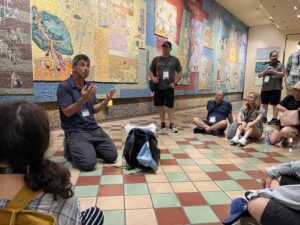
Exploring Tel Aviv History in Four Panels
We began by exploring a huge, 1000 square foot mosaic that tells the story of the founding of Tel Aviv in four panels and in four color schemes ranging from 1. Green – where a green garden where a green garden exists, but it was planted and tended by others. 2. Yellow refers to the sand where Tel Aviv will be built, 3. Red – representing the labor and culture of the new town, and finally 4. Blue – where the visage of a woman looks lovingly down on a town with all its color.
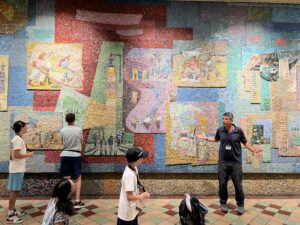 But a city is one facet of what was created inside the buildings of Tel Aviv. We gathered outside a building that has long been under renovation. Inside that building, David Ben Gurion, Israel’s first Prime Minister, read a 35 minute declaration announcing Israel’s formation. Just like with the US Declaration of Independence, Israel’s declaration was met with an immediate war with her neighbors.
But a city is one facet of what was created inside the buildings of Tel Aviv. We gathered outside a building that has long been under renovation. Inside that building, David Ben Gurion, Israel’s first Prime Minister, read a 35 minute declaration announcing Israel’s formation. Just like with the US Declaration of Independence, Israel’s declaration was met with an immediate war with her neighbors.
It is truly remarkable that the work of those men and women, now sentry-five years later. has led such a dynamic and vibrant country. Sure, problems remain and probably always will, but the strength, wisdom and perseverance of those founders is truly remarkable.
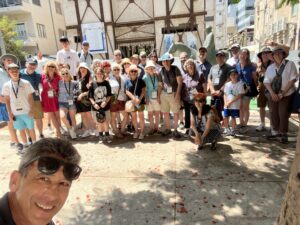
Our group outside of Diezengoff house (aka Independence Hall). Notice Waldo (Uri) in the corner.
Burgeoning Marketplace
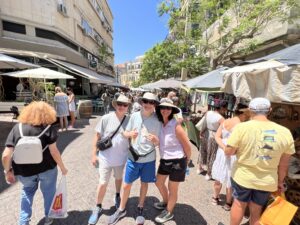 We then headed to Nachalat Benyamin which is an open-air market that meets twice-a-week on Tuesday and Fridays. This street fair requires all of the artists to be approved by a committee, create individual hand-made work, and sell their own art.
We then headed to Nachalat Benyamin which is an open-air market that meets twice-a-week on Tuesday and Fridays. This street fair requires all of the artists to be approved by a committee, create individual hand-made work, and sell their own art.
Throngs of people find deal after deal at the Carmel Market.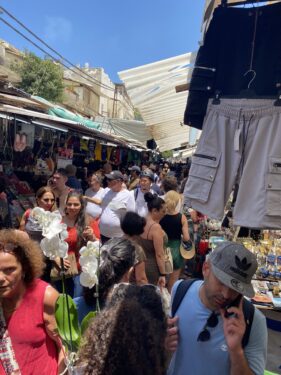
Just around the corner from the arts and crafts market is a produce market called the Carmel market. Fragrant spices, sweet pastries, and farm-fresh fruits and vegetables line the narrow streets where it is easy to get swept away by the sea of people who pass by on foot, especially on Friday when people shop and prepare for Shabbat. Just as God created the world and the Zionist leaders created a nation, on Friday afternoon, the simple act of creating a meal for one’s family and friends takes center stage.
Shabbat at Kehillat Birkat Shalom in Kibbut Gezer
And speaking of Shabbat, ours was absolutely lovely. We were hosted by Kehilat Birkat Shalom (Congregation Blessing of Peace) that is located on and is part of Kibbutz Gezer. If anyone has read James Michener’ tome The Source, then you should know that they fictional Tel Makor described in the book is based on the Tel Gezer from which the kibbutz gets its name.
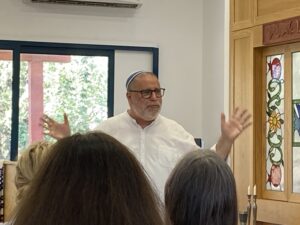
Rabbi Steve Burnstein of Kehilat Birkat Shalom
We were welcomed by Rabbi Steve Burnstein who was born in Kansas and moved to Israel around thirty years ago. We learned that, on every kibbutz, they are trying to figure out how they will be organized in the future. Will they be fully socialist where all money and resources are share? Will they become totally privatized where everyone owns their own home and possessions? Or will it be a hybrid? We will only learn what will happen by keeping connected during this ongoing story.
Rabbi Burnstein led us in a beautiful Kabbalat Shabbat service that can be found here. Like many things on Kibbutz, it was informal and hamish. We were then treated to a dinner outdoors at the kibbutz that was absolutely delicious. But even more importantly, we sat with Kibbutz members who were incredibly open to answering questions and engaging in meaningful discussion.
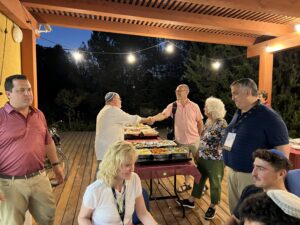
Kibbutz – TAE person-to-person encounter
Sandy and I chatted with three kibbutz members who were also brothers: one was in college in Jerusalem, one in his active army service, and one still in high school. Like many students in Israel, the two older brothers had devoted a year to public service between high school and college. There is such a strong sense of personal responsibility to others among the children raised on kibbutzim that I can’t help but wonder if they have found a delicate balance that we sometimes lack in our highly privatized lives.
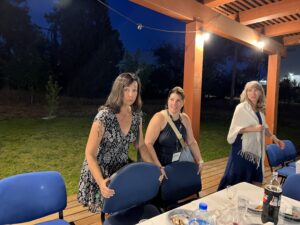
Everyone Carries Chairs on Kibbutz
As the evening wound down, we all adopted that same spirit of mutual responsibility as we cleaned up the chairs and headed back to the hotel, excited for another busy day tomorrow.
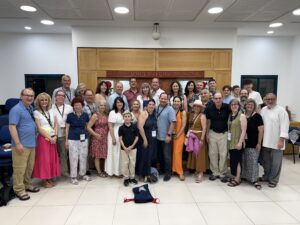
Shabbat at Kehilat Birkat Shalom
